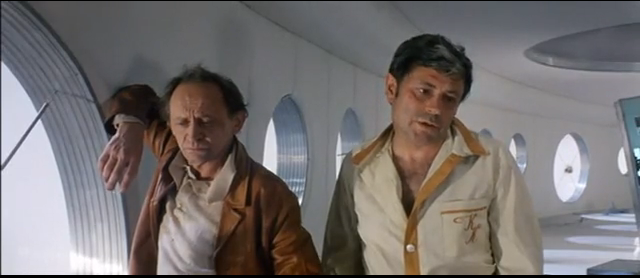Lost in Space: Tarkovsky’s Solaris

An astro-psychologist named Kris Kelvin (Donatas Banionis) gets launched into outer space, only to find he’s brought all his earthly problems with him. They are stunningly explored in Solaris (1972), Andrei Tarkovsky’s meditative sci-fi classic. For Tarkovsky, space is not the final frontier—humans are.
Kelvin’s mission is to explain the erratic behavior of some scientists at an international space station. It becomes clear soon enough: they’re orbiting a vast ocean that seems to have a consciousness of its own, and probes their minds, producing material copies of people buried in their memories. Hence the appearance of a living, breathing replica of Hari (Natalya Bondarchuk), Kelvin’s deceased wife, in his cabin.
“Don’t turn a scientific problem into a common love story,” one of Kelvin’s half-crazed colleagues warns him. But Kelvin, given a chance to redo a tragic love affair, can’t help himself—and nor, to an extent, can Tarkovsky. Solaris is often compared to 2001: A Space Odyssey, but the Russian director found Kubrick’s vision unappealingly cold and sterile. In Tarkovsky’s loose adaptation of Stanislaw Lem’s novel, the humans aren’t robot-like; they’re porous, volatile, coming apart at the seams. Implicitly and explicitly, Solaris questions our need to voyage to the far ends of the universe; for Tarkovsky, whose barely futuristic vision is peppered with Old Master paintings and strains of Bach, Earth’s comforts and boundless mysteries are more than enough.
Solaris, Tarkovsky’s most mainstream movie, didn’t please everyone; the director’s utter disinterest in science fiction frustrated Lem to no end, and his preoccupation with divinity, in this film and others, made Soviet censors wary. But as Phillip Lopate writes in an essay that accompanies the new Blu-Ray edition, Tarkovsky charted a “metaphysical dimension” that was largely ignored by his secular-minded contemporaries in world cinema.
One of those peers, Akira Kurosawa, visited Tarkovsky on set and noted appreciatively that Solaris “tortures” viewers with nostalgia for the colors, sounds, and textures of the home planet. Tarkovksy’s strikingly original visual language works its subtle magic during the space scenes, which seem disengaged from real time. And his quest to express earth’s natural, complicated beauty is part of the oddly transcendent soundtrack, too. According to the film’s composer, Eduard Artemyev, “It had to be fluid and diverse, like nature itself.”
SOLARIS IS OUT TOMORROW ON CRITERION BLU-RAY AND DVD. FOR MORE INFORMATION OR TO ORDER THE FILM, CLICK HERE.






